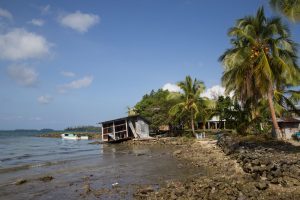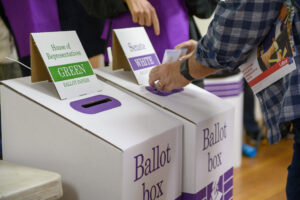The Voice is a proposal from Indigenous people, not politicians.
Today, Australians have the opportunity to enshrine an Indigenous Voice to Parliament in the Constitution
The Yes campaign has certainly been infused with a renewed momentum; many people remain undecided, and most of us will vote today. But irrespective of the outcome of today’s referendum, the yawning gap between Indigenous and non-Indigenous Australians remains our collective national responsibility to solve.
It can be done. You need only look at the huge success Aboriginal community-controlled health organisations (ACCHOs) had in managing the pandemic to see that it is not only possible to close the gap, but to reverse it. The key is to empower Indigenous leadership and to get governments to listen to that leadership.
When the pandemic hit, all around the world First Nations communities were experiencing Covid infection rates up to ten times higher than the general population. But not in Australia. In Australia, there was a complete reversal of the gap, thanks to Aboriginal leadership.
“Aboriginal health leaders at every level brought in worlds best practices and applied them in all urban, rural and remote locations. Instead of the many hundreds of cases, hospitalisation and deaths expected, there were only 150 cases nationwide with 15% hospitalised but no one in ICU and no deaths,” according to an article by academics including former Australian of the Year Professor Fiona Stanley and Professor Marcia Langton in the Journal of Paediatrics and Child Health.
The Voice is the mechanism developed by Aboriginal people to make it easier for government to listen to advice from Indigenous people and communities – whether on health, housing, education or over-incarceration. It is an advisory body, nothing more. It has no veto power.It can’t make laws or raise taxes. Its powers will be designed and passed by the parliament in the same way that same parliament recently established the National Anti-Corruption Commission. As members of parliament, Peter Dutton and Senator Jacinta Nampijinpa Price would have a democratic role in shaping the Voice legislation.
Constitutional lawyer Greg Craven reflected that he helped design the Voice as something so modest that no reasonable non-Indigenous Australian could reject it, “More fool me,” he said.
As veteran journalist Kerry O’Brien and others have observed, the strategy from the No campaign has been borrowed from former Trump advisor Steve Bannon, to “flood the zone with shit”. Journalists have raised concerns about what the success of this strategy might mean for future election campaigns and for the future of our democracy.
Chief political correspondent for ABC730 Laura Tingle warned the political implication is that “It’s a further push into this idea that you just attack, you just tear down & you have nothing positive to say about virtually anything.” We need to start work now towards implementing reforms like truth in political advertising if we are to prevent citizens from being flooded with shit at every future election.
But today is about the referendum. A year ago, the Voice enjoyed upwards of 60% support across Australia, but the No campaign has successfully chipped away at that support. Characterised by misinformation, lies and vitriol, the No campaign has declared the Voice to be simultaneously all-powerful—nothing short of a ‘declaration of war’—and completely useless. The result of this flood of excrement? Doubt and confusion. On Thursday, Radio National interviewed a bloke who wanted Indigenous Australians to have a Voice rather than have “someone else to assume things and say things on their behalf”, but voted No because he got the impression from TikTok that the Voice was “more of a land-grab type of thing”. To be clear – there is no threat of any ‘land grab’ from an advisory body with no legal powers.
So, let us take this last opportunity to clear up some of that doubt and confusion as people head to the polling booth today. If you have concerns about the constitutional implications of the Voice, you should know that former Judges say the Voice will both ‘enrich our democracy and increase the likelihood of governments making correct decisions about matters that affect Indigenous peoples’. While more than 70 constitutional law experts and academics say the Voice is ‘not constitutionally risky’.
If you have concerns the Voice won’t do enough to practically close the gap in life expectancy and health outcomes, consider that more than 125 of Australia’s leading health organisations back the Voice as “an opportunity for us to make a practical difference, to ensure the gap between Aboriginal and Torres Strait Island peoples and non-Indigenous Australians does not continue to widen”. If you are concerned the Voice will be divisive, consider that over 100 migrant and cultural organisations back the Yes campaign for Voice referendum as an opportunity for the whole nation—all cultures—from people born here to new migrants, to come together and “to address this historical injustice and heal the wounds and the hurt of our country”. And that more than two dozen former Australians of the Year back the Voice, saying “It is not about giving one community an advantage but about reducing a severe and unacceptable level of disadvantage and discrimination. A Yes vote is a step to a more united and cohesive nation, conscious of the past and looking together to the future.”
If you are concerned that the Voice won’t make a practical difference in the lives of Aboriginal people living in remote communities, consider that every Land Council in the Northern Territory, representing more than 75,000 Indigenous people, are asking Australians to vote Yes.
The Voice is a proposal from Indigenous people, not politicians. It comes from one of the most extensive and democratic consultations with Indigenous people in our nation’s history.
The Uluru Statement from the Heart says, “When we have power over our destiny our children will flourish”. Whatever the result of today’s referendum, that is the purpose all Australians must carry forward.
Between the Lines Newsletter
The biggest stories and the best analysis from the team at the Australia Institute, delivered to your inbox every fortnight.
You might also like
Our crisis of integrity looms in the Pacific
“An Albanese Labor government will restore Australia’s climate leadership, and listen and act on Pacific island warnings of the existential threat of climate change.” Despite a clear election campaign commitment to listen to Pacific Island nations and act on climate change, the Australian government continues to enable and encourage new and expanded fossil fuel projects. When it
Unfinished Business: Towards a settlement on Aboriginal land rights in the ACT
The Australia Institute has today published a discussion paper on the barriers to progress on Aboriginal land rights in the ACT. The paper explores the issues that need to be resolved before the ACT Government can make progress on treaty discussions. Key Findings: The transfer of the land of the ACT from NSW to the
The rise of early voting in Australian elections
Are voters missing out on more than their democracy sausage?


